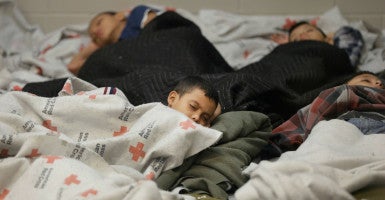The Obama administration isn’t prepared for a revived wave of unaccompanied children crossing illegally into the United States, Senate Judiciary Chairman Chuck Grassley, R-Iowa, said Tuesday.
In opening remarks before a Judiciary Committee hearing, Grassley criticized the White House for “shirking responsibility” while the influx of Central American children fleeing across the U.S.-Mexico border threatens to outpace 2014’s crisis.
“We have to have compassion for these people,” he said at one point, “but we also have to have enforcement under the law.”
Sen. Jeff Sessions, R-Ala., a member of the committee, hit immigration officials for allowing 97 percent of illegally arriving children to stay in the country.
Grassley cited a new government report that found that the Department of Health and Human Services failed to establish a “systematic” plan to handle renewed surges of unaccompanied minors in 2016 and beyond.
From October through January, federal immigration officers caught 20,455 such children at the border—more than twice the number caught during the same time span the year before.
If the trend continues, Grassley warned, this year’s numbers could outpace the more than 68,000 unaccompanied minors caught in 2014.
Sessions said immigration officials failed to monitor illegally arriving children adequately, enabling 97 percent to avoid deportation.
During the past two and a half years, Sessions said, only 4,680 of the more than 127,000 such minors were deported.
Sessions said the administration’s lax policies signal to others in Central America that if they make it to the U.S., they will be released. This, he said, would prompt children to “take undue risk” to illegally cross the border:
I think nobody’s looking for them. The system is not working. All you have to do is come into the country unlawfully, be released into the country, and if you don’t show up for court, you’re never looked for, and you aren’t deported.
Administration officials testified that they had taken steps to correct their failure to ensure the safety of unaccompanied children who crossed the border but made little mention of how they planned to halt the flow.
Ronald Vitiello, deputy chief of the Border Patrol, said U.S. Customs and Border Protection had improved its screening process for apprehended minors to better determine whether a child is a victim of human trafficking.
Vitiello said the Border Patrol also is beginning to implement automated systems to better document children once they are transferred to the Office of Refugee Resettlement, which will improve the agency’s ability to monitor how long a child stays in custody. The refugee office is part of the Department of Health and Human Services, or HHS.
Mark Greenberg, acting assistant secretary at HHS’ Administration for Children and Families, testified that his agency’s guiding principle when releasing minors to sponsors is the children’s safety and well-being. He called the ongoing border surge a “refugee crisis.”
At the request of Grassley and other Senate leaders, the Government Accountability Office investigated how the administration responded to the tens of thousands of Central American children who have entered the U.S. over the past few years.
The findings, released Monday, revealed that the Office of Refugee Resettlement doesn’t have a system to track unaccompanied minors once they’re released from government detainment to a sponsor. Sponsors, who are vetted by the refugee office, are supposed to care for the children and take them to immigration court for a determination of their status.
The government’s inability to monitor children once they go to a sponsor, critics say, has enabled some to escape government tracking and caused others to end up in homes where they are abused or forced into coerced labor.
Grassley called the findings “troubling” and criticized immigration officials for “cutting corners” that he said led to minors falling into the hands of human traffickers or being “pawned off” to adults who sexually abuse them.
“[Government officials] need a plan, they need to learn from their mistakes, they need to ensure that minors are quickly and safely returned to their home country, and they need to be held accountable,” Grassley said.
“We have to have compassion for these people, but we also have to have enforcement under the law.”































